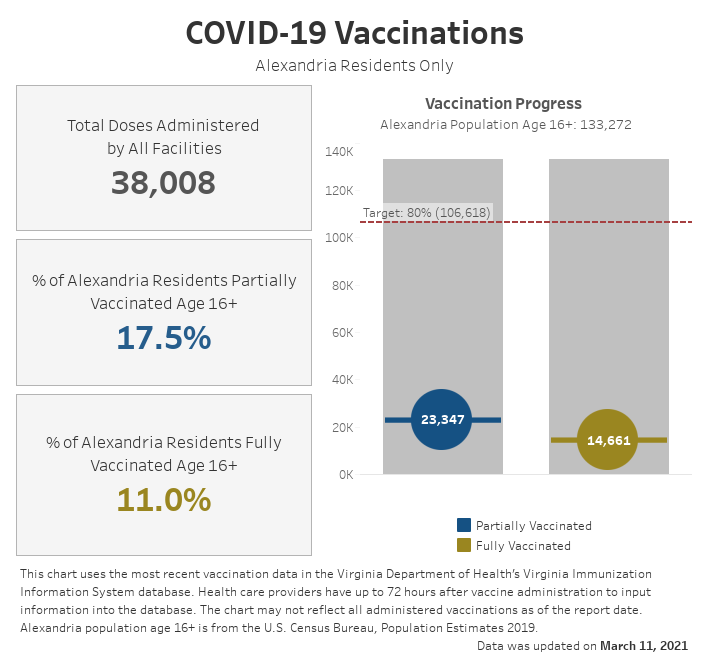For Immediate Release: March 11, 2021
The City of Alexandria and the Alexandria Health Department (AHD) strongly urge residents to stay home as much as possible, wear a mask over both your nose and mouth, and wash your hands frequently. Pre-register to receive the vaccine and you’ll be notified once appointments are available. AHD estimates that approximately 1 in 20 Alexandrians who have tested positive for COVID-19 have required hospitalization, so without these critical steps, additional lives may be at risk.
The U.S. Department of Health and Human Services (HHS) has issued revised guidance for how long-term care facilities manage the risks of COVID-19 after being severely impacted by the pandemic. The new HHS guidelines allow for additional activities and visitors now that many long-term care facility residents and staff have been vaccinated. Highlights include:
Residents are now permitted to have physical contact with visitors only if the resident is fully vaccinated and both parties wear masks. HHS recommends the following to make close contact visits safer:
The Centers for Disease Control and Prevention has updated guidance to help
workplaces and businesses plan, prepare, and respond to providing a safe environment for workers, and for employees to follow to help keep their workplace safe. General guidance is provided for employers and specific guidance is broken down by industry, including transportation and delivery; essential services; food services; manufacturing and industrial; personal services and hospitality, and more. Frequently Asked Questions are searchable by keyword and provides answers about suspected and confirmed COVID-19 cases in the workplace; reducing the spread in the workplace; cleaning and disinfecting the workplace; ventilation, and more. Resources to help with planning, policy and operations; managing cases, testing, and contact tracing; and coping with stress and fatigue, as well as printable flyers and signage. The City’s
Catalog of Multilingual Resources offers materials that are specific to Alexandria, many of them translated into Spanish, Amharic and Arabic, and all are available for download and print, or
can be requested.
The
viral vector vaccine is one type of COVID-19 vaccine that has received Emergency Authorized Use for distribution by the U.S. Food and Drug Administration. Viral vectors have been used in vaccines and studies since the 1970s, most recently to fight outbreaks of the Ebola virus. Viral vector COVID-19 vaccines inject a harmless virus that the body uses to produce a spike protein that is found on the surface of the virus that causes COVID-19. The immune system then recognizes that the spike protein doesn’t belong there and begins to fight off what it recognizes as an infection by producing antibodies and activating other immune cells to attack the spike protein. This process teaches the immune system to identify the COVID-19 virus in the future and protect the body. Viral vector vaccines do not include the COVID-19 virus, do not cause someone to become infected with COVID-19 and do not affect or interact with a person’s DNA.
Johnson & Johnson is currently the only manufacturer of a viral vector COVID-19 vaccine authorized for use in the U.S., and requires one dose, instead of two. Side effects from a COVID-19 viral vector vaccine are similar to the mRNA vaccines being used by Moderna and Pfizer, ranging from pain and swelling at the injection site to chills, fever and fatigue throughout the rest of the body, and subside within a couple of days of receiving the vaccine.
The seven-day moving average chart below shows the number of COVID-19 cases and the daily and cumulative case and fatality counts, and provides detailed information about how preventive measures are impacting Alexandria's response to the pandemic. An interactive version is available at alexandriava.gov/114883. The vaccination chart includes total doses administered across all facilities and the percentage of residents ages 16 and older who have been partially and fully vaccinated, and is available at alexandriava.gov/120654. Detailed data, including data on age, race and ethnicity, are available through links at alexandriava.gov/Coronavirus.


Continue following measures to stop the spread of COVID-19 even after vaccination.
Get tested if you have been exposed to someone with COVID-19. If you test positive, help loved ones and neighbors by informing your close contacts using “
What to Do If You Get Sick” guidance, which is available in
Spanish,
Amharic,
Arabic, and
Farsi or this brief
video.
© 1995–2022 City of Alexandria, VA and others • Privacy & Legal • FOIA Requests